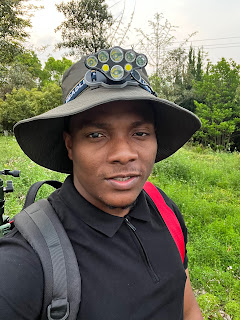Ripping Off the Mask of Imposter Syndrome with Guest Blogger Joel Robison
Ripping Off the Mask of Imposter Syndrome
A Special Guest Blog written by photographer, mentor, and mental health advocate Joel Robison
A few months ago I had what most artists would call a career highlight. I opened an exhibition of my work in my hometown, an evening event with a hundred or more people. My images printed and hung around the gallery while music played and people mingled, some purchasing the art to hang in their offices or homes. And yet, for the week prior to this event I was almost entirely paralyzed with dread. I thought of every possible way to avoid going, even though my name was literally on the wall. And why? Our old friend Imposter Syndrome.
Imposter Syndrome is an experience that manifests itself in different ways for people, but largely it’s a pattern where you constantly doubt your skills, accomplishments and talents and live with a persistent fear that you’re going to be caught as a fake, or a fraud.
Maybe this is something you’ve felt, when you share your work online, or sell a print or image to be used. That sneaking feeling that whispers in your ear, “They’re gonna find out”.
~~~
I don’t exactly know when I first started feeling this happen to me but it was certainly before I knew what it was called and that others felt it too. I remember sharing my work with others and instead of feeling pride or excitement, I downplayed it. I wouldn’t say “It took me hours to learn how to do this.” I would say “Oh it’s just pushing buttons” or “It’s just weird little photos I do.” That downplaying feeling that maybe we’re all guilty of doing, is a way to protect ourselves, but it’s not helpful or true!
Over the years this feeling started to impact every single part of my career. I didn’t want to show my work to anyone face to face because I would scan their faces for any hint of reaction that could match my inner saboteur. I would feel an anxiety attack coming each time I would share something on social media because I felt ” this is going to be the one that rips the veil off and shows everyone how bad I really am at this.” I would fear working with clients, I would sink further into anxiety and pull away from talking about my work with other people. All because I was listening to a ghost voice that didn’t know what it was talking about.
Imposter Syndrome is a real experience and it’s one that can be helped and hopefully overcome. And it’s important that if you’re feeling the impacts of this, that you work to see yourself through it. When we feel this imposter syndrome phenomenon we limit our own growth. One of the biggest limitations that I put on myself, because I constantly feel like I’m not that great at what I do, is that I don’t even attempt to start projects, or reach out to potential clients or opportunities because I assume their answer will confirm what I already think. You can see how damaging that can be for our mental health and for our creative minds not to mention our businesses!
So how can we begin to overcome these feelings? There’s a few things that experts have suggested and they match quite closely with what I’ve found to help as well.
Understand what Imposter Syndrome is
Like with any condition or experience, it’s always a good idea to get a good grasp on what imposter syndrome looks like. It may look different for different people and understanding more about the different types or common symptoms of it can help you to understand that feeling in yourself. There’s lots of information out there, but I got a lot out of this TedTalk that shared about Imposter Syndrome and how to navigate through it:
Share how you’re feeling with someone you trust
Last week when I started to get that fight or flight (which usually always flight for me) feeling around my exhibition I shared how I was feeling with my partner and with a trusted friend. There’s such a benefit in getting our emotions out of our heads and allowing someone else to explain them in a clearer way than we might be able to.
Having those honest conversations and sharing how I was feeling helped me realize that it wasn’t accurate and their kind words and supportive feedback helped me to replace that negative self talk with courage and a bit more patience for myself.
Record the triumphs
Toot your own horn! It’s important! I started to collect things that really did make me feel like I’d done something really good with my work. It might be a really supportive message on Instagram, or a photo of a conference I was invited to or a copy of a magazine cover. Having those tangible records will help remind you that you are good enough, that people do want to see what you create and they support you. It can be as simple as creating a folder of screenshots or making a scrapbook, but having those visual reminders really helps me to recharge my self-love.
Try To Let Go Of Being Perfect/Other
It’s no surprise that the rise of social media has given a rise to Imposter Syndrome. We’re force fed a continuous stream of information at all hours of the day and we feel we have to keep up. I know sometimes I feel like a fake because I don’t always have great behind the scenes content or I don’t share enough. The constant need to be perfect and to share perfect things is a surefire way to implode your self esteem. We’re not meant to be perfect, we’re not doughnuts.
It’s great to be able to see and appreciate the work of others but that appreciation shouldn’t cross the line into making us feel not worthy enough to share. It’s taken me a long time to appreciate that I may share an image that isn’t perfect but it’s still good, it’s still me, and it’s still telling a story about how I was feeling and that’s what I want it to do.
Accept It
This might sound like the least helpful advice but honestly it’s something that I think has helped me. Just accepting that you might feel this way sometimes. When I first started talking to other artists that were feeling this way, I suddenly felt like less of an outsider and I felt a bit more understood, it helped me to know that I wasn’t alone and that if the people I look up to can feel this way and continue to share and create then I can too.
Acceptance doesn’t mean gladly carrying it around with you and pretending like it’s not heavy, it just means that you acknowledge that it’s something you’re feeling and knowing that with some extra help or time or effort, you can blast that imposter syndrome feeling out of your mind for a while and continue on doing what you do best, creating beautiful art.
~~~
I know that I’m always going to feel this way, that when I have to give a speech or teach a workshop or work with a client, I’m going to get that mean little Joel on my shoulder whispering “everyone thinks you suck” into my ear. But I also know that because I’ve taken the time to understand it, to fill an emotional first aid kit of accomplishments and good memories, and that I can talk to loved ones about it, I can flick that little voice off my shoulder and focus on the friendly one that tells me to keep going.
I hope you too can listen to the friendly one that tells you to keep going.
~Joel




Comments
Post a Comment